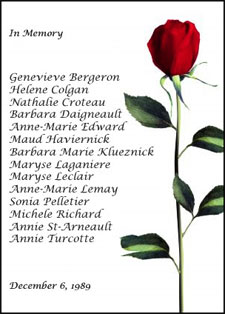This is an archive of news stories and research from the National Union of Public and General Employees. Please see our new site - https://nupge.ca - for the most current information.
More than 20 years after the tragic events in Montreal, violence against women continues to be a serious issue in Canada.
 Ottawa (3 Dec. 2010) – On Dec. 6, 1989, a deranged gunman entered L’Ecole Polytechnique in Montreal. He segregated the female students from the male students and began firing at the female engineering students.
Ottawa (3 Dec. 2010) – On Dec. 6, 1989, a deranged gunman entered L’Ecole Polytechnique in Montreal. He segregated the female students from the male students and began firing at the female engineering students.
On that day, 14 young women lost their lives to violence. The event has become known as the Montreal Massacre and is symbolic of the fight to end violence against women. In 1991, Canada’s Parliament declared December 6th a National Day of Mourning and the National Day to End Violence Against Women.
The facts:
Violence against women continues to be a serious issue in Canada:
- It is estimated that 60% of Canadian women have suffered from physical or psychological violence at some time in their life.
- In 2007, nearly 40,200 incidents of spousal violence were reported to police. This represents about 12% of all police-reported violent crime in Canada.
- Between April 1, 2007 and March 31, 2008, approximately 101,000 women and children were admitted to 569 shelters in Canada.
Aboriginal women are the most at risk group in Canada for issues related to violence:
- According to the 2004 General Social Survey, Aboriginal women 15 years and older are three and a half times more likely to experience violence than non-Aboriginal women.
- Young Aboriginal women in Canada are five times more likely than other women of the same age to die as a result of violence.
- Between 1997 and 2000, homicide rates of Aboriginal females were almost seven times higher than non-Aboriginal females.
“This is the reality facing women and girls in this country who continue to be victims of violence,” says national president James Clancy.
“As Canadians we must make certain that adequate funding is provided to transition homes, women’s emergency shelters, second stage housing and safe home networks in order that those who are escaping physical and psychological domestic abuse have a safe haven.
"We must also make sure that programs are made available that provide education and awareness to younger women who are the most vulnerable to the risk of domestic violence,” Clancy says.
“Ensuring that women’s groups that lobby and advocate women’s equality and an end to violence have a voice is crucial. And it is essential that initiatives such as the Sisters in Spirit, which has done such vital work in bringing attention to violence against Aboriginal women and girls, have sufficient funds to continue their work."
Sisters in Spirit
Sisters in Spirit (SIS) is an initiative launched by the Native Women’s Association of Canada (NWAC) to address the issue of the hundreds of Aboriginal women and girls who have either disappeared or have been found murdered in Canada over the past few decades.
The SIS initiative has worked to identify root causes, trends and circumstances of violence that have led to these disappearances and deaths. It has created a database of these cases. It also provides a way to honour these missing and murdered Aboriginal women, their families and their communities.
In March 2010, NWAC released a report entitled What Their Stories Tell Us which provides evidence that 582 Aboriginal women and girls have gone missing or have been murdered in Canada.
The federal government recently announced it would disallow government funding to NWAC for projects using the name Sisters in Spirit or to upkeep the database.
NUPGE recently wrote to Prime MInister Stepehn Harper to express deep concern over this decision. The letter stated, “The Sisters in Spirit name, as well as the Grandmother Moon logo, signify to many Canadians the memories of their missing or murdered loved ones....It would seem punitive to make funding for NWAC’s continuing work on this critical issue contingent on the removal of the name and the abandoning of their database which has made huge strides in bringing to light this national tragedy.”
Join us in taking action:
- Lobby the federal and provincial governments to ensure adequate funding to transition houses and emergency shelters.
- Send a letter to the federal government stating your support of NWAC’s Sisters in Spirit and urging them to make ongoing funding to this activity a priority.
- Donate to your local women’s shelter.
NUPGE
The National Union of Public and General Employees (NUPGE) is one of Canada's largest labour organizations with over 340,000 members. Our mission is to improve the lives of working families and to build a stronger Canada by ensuring our common wealth is used for the common good. NUPGE
More information:
• NUPGE asks Harper to restore funding for NWAC
• Native Women's Association of Canada
